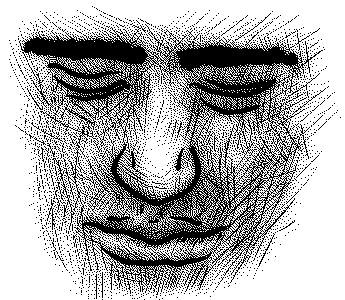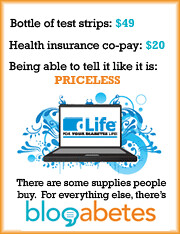
Math has never been my friend. It's been the bane of my existence and the savior of my life - all at the same time - since I was in grade school. Math and I - we have a love/hate relationship, for sure.
Lately though, I am perpetually frustrated that, in spite of me and math being totally in-sync when it comes to my diabetes care, I am still landing up with bloodsugars that don't make sense. I wish the rules around diabetes care - around dosing, bloodsugars, and all of the phenomenon that come along with the disease - were more finite, more consistent. You know - if I do X then Y happens...
Some examples.
I'm starting with a bloodsugar of 120. If I eat a corn muffin and the package says it has 45 grams of carbohydrate, I'll give 3 units of insulin. If I eat a large sized wheat roll and the package says it has 45 grams of carbohydrate, I'll also give 3 units of insulin for that. I'll give a slight correction to bring my bloodsugar down to my goal bloodsugar of 105 - that's another .3 in both cases. Why - oh why - when I eat one does my bloodsugar skyrocket to 255 and when I eat the other, I slide in at 108?? I know - the fat content, the sugar content, the fiber all factor in... But does anyone have a formula that will help me to get it right every time or even every other time? If you set rules, I can follow them - I don't like to - but I can.
Another example... If I test at 80 and I feel symptoms of a low, should I always treat? In the past, I've found that treating a bloodsugar that high results in a bloodsugar too high for my comfort (say, in the low to mid 200s) - and I've found that sometimes not treating results in a flummoxed and angry Nicole with a 41 on her hands. How do I tell the difference between a normal bloodsugar that's on its way to a low and a normal bloodsugar that's going to stay exactly where it is - or even worse, that's going to rise astronomically? And how does the Somogyi effect factor into this? When does Somogyi kick-in? At 80 is my body already trying to bail me out or do I have get really low to have it happen? Can someone, somewhere please come up with some rules around this stuff? Because there is nothing worse than a 55 that turns into a 300 within 3 hours or an 80 that turns into a 40 in 30 minutes...
I just want this to make more sense - I want it to be more rules-driven and less trying to hit a pencil mark dead-on using a faulty weapon. Some days, I think I'm not equipped to deal with the chaos and nonsense that is this disease. I need some order.





